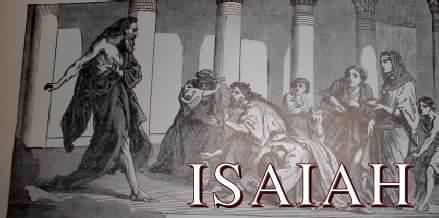
The Plan of Isaiah
The Bible Teaching Commentary
Paul J. Bucknell
_________________________
The Overview of the Book of Isaiah
The Purpose of Isaiah: Redemptive Chart of Isaiah
The Plan of Isaiah: Light & Dark Diagram
The Chonology of Isaiah
The Outline of Isaiah
Discussions of Main Sections of Isaiah
The Plan of Isaiah: A Contrast between Light and Darkness
Below is a chart of the words of judgment in contrast to the words of promise planted through the Book of Isaiah. The dark dripping shadows refer to the number of verses focusing on judgment.
Isaiah is a book about our trust, a book about our beliefs. One would expect God's people to follow His leading in life, but right from the beginning, we see a people who do not even know who their God is.
God is not embarrassed about their waywardness and clearly exposes their many sins. But despite their unfaithfulness, God has put in motion a plan which will not be frustrated by man or nation. His redemptive plan begins to take form right from the beginning of the book. Although it takes a number of unexpected turns, it clearly evolves into a beautiful masterpiece, intertwining kingdoms and individuals, rich and poor, the proud and the humble.
Through the prophecies and discourses, God explicitly shows He will shatter the proud and lift up the humble. Although the darkness is so thick, there are incessant revelations of light that shake apart the fortress of night and establish the kingdom of light.
The small specks of light reflected in the scattered promises throughout Isaiah have unimaginable results. The worthless vineyard (5:6-7) ends up spreading throughout the earth (27:6). The shoot of Jesse springs forth (11:1-2). The helpless infant becomes a sign of judgment (7:14). Still, also of great salvation (9:6). The repeating judgments of different individual nations (14:31) are consummated in a great final judgment for all the nations (24). And God's promises to a few people of one nation (10:22) are fulfilled in the execution of the great redemptive plan involving many peoples (66:19) and a new heaven and earth (65:17).
info@foundationsforfreedom.net
Scriptures typically quoted from the New American Standard Bible unless noted:
(C) Copyright The Lockman Foundation 1988











